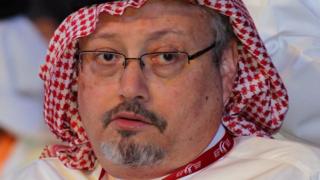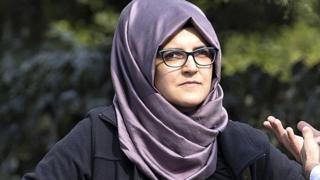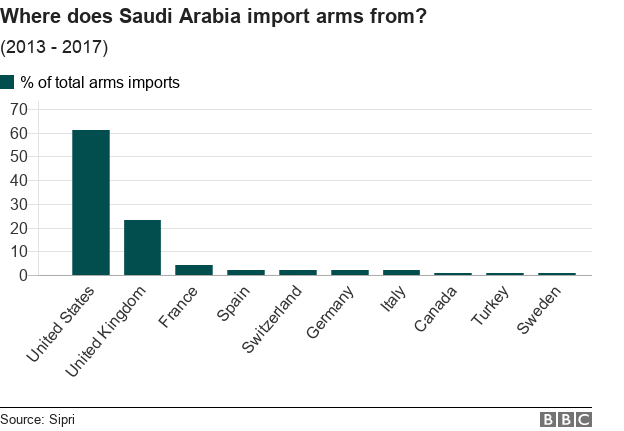 Image copyright Reuters Image caption Adel al-Jubeir conceded that some people had exceeded their authority.
Image copyright Reuters Image caption Adel al-Jubeir conceded that some people had exceeded their authority.
Saudi Arabia’s foreign minister has said the suspects in the killing of journalist Jamal Khashoggi would be prosecuted in Saudi Arabia.
At a conference in Bahrain, Adel al-Jubeir accused the Western media of “hysteria” in its coverage of the case.
His comments come a day after Turkey said it wished to extradite 18 Saudi nationals who authorities say were involved in the murder.
The writer was killed in the Saudi consulate in Istanbul three weeks ago.
Riyadh denies the ruling royal family was involved and blames “rogue agents”.
 Image copyright EPA Image caption Jamal Khashoggi was an outspoken critic of the Saudi government
Image copyright EPA Image caption Jamal Khashoggi was an outspoken critic of the Saudi government
Fear over where murder trail leads
Analysis by BBC security correspondent Frank Gardner in Bahrain
Saudis are describing the Khashoggi murder as their biggest crisis with Washington since the 9/11 terror attacks of 2001.
On Saturday, US Defence Secretary Jim Mattis, the plain-speaking ex-US Marine Corps general, left the audience here in no doubt about US intolerance of what happened. Both he and the Saudi foreign minister vowed to get to the bottom of who was behind this murder.
But here lies the problem for both countries. If the trail leads, as some suspect, to the all-powerful Crown Prince Mohammed bin Salman, then Western governments may feel obliged to insist on his removal or else downgrade ties with Riyadh. But Saudis worry that, for all his autocratic behaviour, “MBS” represents their hope for a more modern, civil society.
If his power is curtailed, they fear, then hardline clerics will look to roll back many of their newfound freedoms.
What is the US saying?
Washington has tried to keep up the pressure on the Saudis to explain the death fully.
Defence Secretary Mattis said Khashoggi’s death “must concern us all” and that the United States “does not tolerate this kind of ruthless action to silence Mr Khashoggi, a journalist, through violence.
“Failure of any nation to adhere to international norms and the rule of law undermines regional stability at a time when it is needed most.”
President Trump has said he is “not satisfied” with the Saudi account. However, while he has floated the possibility of imposing sanctions. he has also stressed the importance of the two countries’ ties.
Mr Trump also said it was “possible” the crown prince did not know about the killing.
What about Khashoggi’s fiancée?
Hatice Cengiz says she has declined an invitation to the White House from President Donald Trump, accusing him of not being sincere about investigating the killing.
She told Turkish TV she thought the invitation was aimed at influencing public opinion in the US.
 Image copyright EPA Image caption Hatice Cengiz says the US is not sincere in investigating the case
Image copyright EPA Image caption Hatice Cengiz says the US is not sincere in investigating the case
In a tearful television interview on Friday, Ms Cengiz recounted the day her fiancé vanished, saying she would never have let her partner enter the consulate if she had thought that the “Saudi Arabia authorities would hatch a plot” to kill him.
“I demand that all those involved in this savagery from the highest to the lowest levels are punished and brought to justice,” she told Haberturk TV.
She said she had not been contacted by any Saudi officials but that she was unlikely to go to Saudi Arabia for a funeral, should Khashoggi’s missing body eventually be found.
Meanwhile, the US-based writer’s eldest son arrived in the US from Saudi Arabia on Thursday, along with his family. Salah Khashoggi, a dual Saudi-US citizen, had been barred from leaving Saudi Arabia because of his father’s criticism of the country’s leadership, but this sanction was recently lifted.
How do other key powers see the situation?
Turkish President Recep Tayyip Erdogan has called on the Saudis to reveal who ordered the killing and to say where the body is.

The European Parliament on Thursday passed a non-binding resolution urging an EU-wide arms embargo on Saudi Arabia in response to the murder.
Russia has said the royal family should be believed and that “no-one should have any reasons not to believe them,” Kremlin spokesman Dmitry Peskov said.






